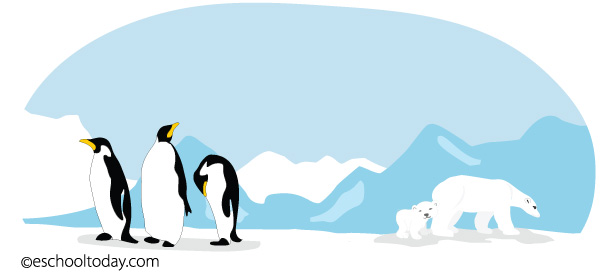- Climate Change
Effects of Climate change
Global warming causes thermal expansion of land and water. It also causes ice sheets to melt in icy regions of the world and mountain tops.
Large volumes of melted ice (water) then flow down into streams, rivers, lakes, and seas. The result is rising sea and water levels, causing floods and massive destruction to low-lying towns and cities located near water bodies.
Research shows that the global sea level rose about 17 centimeters (6.7 inches) in the last century, and the rate in the last decade is nearly double that of the last century. —Source: climate.nasa.gov
Changing climate may also cause the weather to become more extreme, be it droughts or violent storms and heavy rain.
Extreme temperature changes make people suffer breathing difficulties, headaches, body rashes, and other illnesses.
Climate change also distorts the natural habitats and lives of many plants and animals. For example, the survival of polar bears and penguins in icy regions are in danger, as they cannot survive anywhere else. Other plants and animals in warmer regions will die if temperatures suddenly become too cold for them.

The same amount of water in the water cycle will not be affected, but its timing, amounts, regularity, and distribution will be impacted. Mid- latitudes and dry subtropical regions may experience a reduction in water flow, while high latitudes and humid mid-latitude regions may have increased water flow. There may be streamflow uncertainty in many other regions because of reduced snow and ice storage. The availability of clean water may be affected too. For instance, the quality of lakes used for water supply could be impaired by the presence of algae producing toxins.
Did you know…
The Greenland and Antarctic ice sheets have decreased in mass. Data from NASA’s Gravity Recovery and Climate Experiment show Greenland lost 150 to 250 cubic kilometers (36 to 60 cubic miles) of ice per year between 2002 and 2006, while Antarctica lost about 152 cubic kilometers (36 cubic miles) of ice between 2002 and 2005. —Source: climate.nasa.gov
Today’s polar bears are facing a rapid loss of the sea ice where they hunt, breed, and, in some cases, den. Changes in their distribution or numbers affect the entire arctic ecosystem.
If Antarctica’s ice sheets melted, the world’s oceans would rise by 60 to 65 metres (200 – 210ft) – everywhere.
